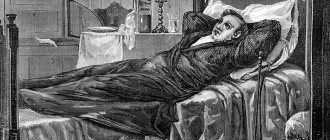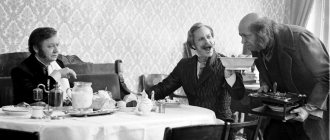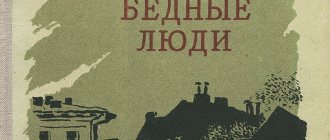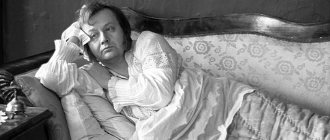Essay on the topic of Oblomov's laziness
I.A. Goncharov’s novel “Oblomov” is a socio-psychological work that describes human life from all sides. The main character of the novel is Ilya Ilyich Oblomov. This is a middle-class landowner who has his own family estate. From an early age he got used to being a gentleman thanks to the fact that he had someone to give and do, which is why in later life he became a slacker. The author showed all the vices of his character and even exaggerated them in some places. In his novel, Goncharov gives a broad generalization of “Oblomovism” and explores the psychology of a fading person. Goncharov touches on the problem of “extra people,” continuing the works of Pushkin and Lermontov on this topic. Like Onegin and Pechorin, Oblomov did not find use for his powers and found himself unclaimed. Oblomov’s laziness is primarily due to his inability to comprehend the task assigned to him. He might even have started working if he had found something to do for himself, but for this, of course, he would have had to develop under slightly different conditions than in which he developed. But the vile habit of receiving satisfaction of his desires not from his own efforts, but from others, developed moral slavery in him. This slavery is so intertwined with Oblomov’s lordship that it seems there is not the slightest possibility of drawing a line between them. This moral slavery of Oblomov is perhaps the most curious side of his personality and his entire history. Oblomov’s mind had been so formed since childhood that even Oblomov’s most abstract reasoning had the ability to stop at a given moment and then not leave this state, despite any beliefs. Oblomov, of course, could not comprehend his life and therefore was burdened and bored by everything he had to do. He served - and could not understand why these papers were being written; Having not understood, I couldn’t find anything better than to resign and not write anything. He studied and did not know what science could serve him for; not recognizing this, he decided to put the books in a corner and indifferently watch as dust covered them. He went out into society and could not explain to himself why people came to visit; without explaining, he abandoned all his acquaintances and began to lie on his sofa all day long. He was bored and disgusted with everything, and he lay on his side, with complete conscious contempt for the “ant work of people”, killing themselves and fussing about God knows what... His laziness and apathy are the creation of his upbringing and surrounding circumstances. The main thing here is not Oblomov, but “Oblomovism.” In his present situation, he could not find anything he liked anywhere, because he did not understand the meaning of life at all, and could not reach a reasonable view of his relationships with others. Oblomov’s principle lives in Zakhara, and in the hero’s visits, and in the life of the widow Pshenitsyna. Zakhar is a reflection of his owner. He doesn't like to do anything, he only likes to sleep and eat. Most often we see him on the couch, and the main excuse for taking any action was: “What, did I just come up with this?” Oblomov’s guests are also not accidental. Volkov is a social dandy, a dandy; Sudbinsky is Oblomov’s colleague who has been promoted; Penkin is a successful writer; Alekseev is a faceless man. Oblomov could have been a social dandy, like Volkov (but women liked him, even very beautiful women, but he alienated them from himself), he could have served and rise to high ranks, like Sudbinsky, he could have become a writer, like Penkin (Stolz , bringing him books to read, turned Oblomov to poetry. Oblomov found rapture in poetry...), and the faceless Alekseev tells us that a choice can still be made. D.I. Pisarev wrote that the concept of “Oblomovism” “will not die in our literature.” What are the roots of “Oblomovism”? Goncharov in the image of Oblomov reveals character traits affected by Russian patriarchal landowner life. “Oblomov’s Dream” is a magnificent episode that will remain in our literature. This dream is nothing more than an attempt by Goncharov himself to understand the essence of Oblomov and Oblomovism. The time of childhood is very important for a person’s life: it forms his moral foundation, the ability to love, value family, loved ones, home. “Our ancestors did not eat soon...” said A.S. Pushkin. Lunch for a Russian person has always been something more than simple satiation. Among all the worries, “the main concern was the kitchen and dinner. The whole house discussed dinner, and the elderly aunt was invited to the council. Everyone offered their own dish: some noodles or stomach, some tripe, some red, some white gravy for the sauce.” “Caring for food was the first and main concern in Oblomovka.” The entire structure of life was subordinated to this concern. The symbol of her satiety was the pie. After lunch came sleep. “It was some kind of all-consuming, invincible dream, a true likeness of death. Everything is dead, only from all corners comes a variety of snoring in all tones and modes.” It was a life similar to a fairy tale, but “the Oblomovites didn’t want any other life.” Characteristic for them was: • peace; • inaction, pettiness of interests; • satiety in everything; • gigantic pie and samovar; • illiterate landowners; • stinginess (with money); • dream. Oblomov’s people never knew any mental anxieties, they never embarrassed themselves with vague mental or moral questions. Oblomovka is a fairy tale in which Ilya Ilyich grew up. The only work of the Oblomovites is eating food. Attitude towards work as a punishment, fear of change, inability to do anything for yourself. The way of life of the ancestors finds its completion in the hero. His parents protected Ilyusha from work, accustomed him to idleness and parasitism, and developed in him a sense of superiority over others. This image has become the largest generalization of global significance. He is the embodiment of vital stagnation, immobility, endless human laziness (a universal human quality). He turned into an apathetic and inert creature. But it is wrong to see Oblomov only as a negative hero. He is distinguished by his sincerity, sincerity, conscientiousness, and gentleness. He is kind (“his heart is like a well, deep”). Oblomov feels that “a bright and good beginning is closed in him, as in a grave.” He is incapable of evil and is endowed with dreaminess. These positive traits were revealed in him by Olga Ilyinskaya. Goncharov subjects his hero to the test of love. Olga begins with love for Oblomov, with faith in him, in his moral transformation... Long and persistently, with love and tender care, she works to awaken life, to evoke activity in this person. She does not want to believe that he is so powerless for good; loving her hope in him, her future creation, she does everything for him, neglects even conventions and decency, goes to him alone, without telling anyone, and is not afraid, like him, of losing her reputation. But with amazing tact, she immediately notices every falsity that manifests itself in his nature, and extremely simply explains to him how and why this is a lie and not the truth. But Oblomov does not know how to love at all and does not know what to look for in love, just like in life in general. He appears before us exposed as he is, silent, brought down from a beautiful pedestal onto a soft sofa, covered instead of a robe only with a spacious robe. His whole life is one big dream. And during this hibernation, we are shown a picture of the life of a person constantly asking himself one question: “What to do?” All his actions boil down to the fact that he lies on the sofa and thinks: “It would be nice if…” There is complete “ruin” in his mind, which he is unable to cope with. Oblomov is a man with a broad soul and a warm heart. He has “heart love” for Olga, and she has “head love”. The lilac branch becomes a symbol of their love. For some time, Olga managed to return Oblomov’s desire to live, but... There was a confession and there was an offer. This love was not destined to continue. Love for Oblomov greatly changed Olga. She matured, became more serious, sad. And Oblomov? He finally found his ideal of life and love. On the Vyborg side in the house of A.M. Pshenitsyna, in the mind of Ilya Ilyich, fairy tale and reality finally lose their boundaries. Pshenitsyna is the complete opposite of Olga Ilyinskaya; Olga’s “head” love is contrasted with traditional “heart” love, which is not guided by goals, but lives with the beloved. With the appearance of Oblomov, Agafya Matveevna’s life is filled with meaning. The Vyborg side is Oblomov’s ideal of life, his beloved Oblomovka. At the end of the novel, faithful friend Stolz once again tries to get Oblomov off the couch, but to no avail. As soon as Oblomov decided that he had achieved his ideal in life, the process of the hero’s dying began. He died quietly and unnoticed, as he lived. But one of the most important questions of the novel remains: What should a Russian person be like? Oblomov, as we found out, is not ideal. Stolz is also not an ideal hero. His activity for the sake of activity carries within it a terrible destructive principle. Stolz cannot feel, suffer, suffer like Oblomov. He lacks imagination. He never asks himself the questions “why?”, “Why?” that so tormented Oblomov. It is not without reason that Goncharov writes a chapter in which Oblomov is no longer present, but we can trace the fate of his son, Andryusha. Perhaps he is destined to become the “prototype” of the Russian person. He, perhaps, will have the same soul as his father, his gentleness, kindness. But, brought up in Stolz’s house, he will acquire business acumen, a love of work, and resistance to the blows of fate. He will be better than Stolz and Oblomov, perhaps... But who knows... The problem raised by Goncharov is a reflection of the Russian national character in Oblomov. Dobrolyubov wrote about Oblomov: “The radical type of Russian life.” The serf way of life shaped both of them (Zakhar and Oblomov), deprived them of respect for work, and fostered idleness and idleness. The main thing in Oblomov’s life is futility and laziness. We need to tirelessly fight Oblomovism, as a deeply alien and harmful phenomenon, destroying the very soil on which it can grow, because Oblomov lives in each of us. Oblomovism is the scourge and evil of Russia, a characteristic feature of our life. The material for the work was Russian life, which the writer observed from childhood.
New in blogs
As a child, each of us wanted to have super powers. Walk through walls, have a flying carpet or an invisible hat. By the age of 20, fantasies faded away and harsh reality took their place. Work-home-marriage-children.
Do you want to fly around the world? Make money. Do you want to eat something tasty? Make money.
You can howl out of boredom.
But I took a different path. I learned to see hidden meaning in things and phenomena. How?
I watch a movie or read a book. And then I look for reviews on the Internet. But not “like/dislike” reviews, but thoughtful reviews. They open my eyes to things I never even thought about.
So, the other day I listened to a discussion on the Internet about Goncharov’s novel “Oblomov”.
The lecture was given by Dmitry Bykov, our Russian writer and literary critic. I must admit that I myself would not have thought of thinking about the book.
In short, Bykov suggested looking at Oblomov not as a bored and lazy gentleman, whose life passes while he sleeps on his sofa. What about a person without motivation?
Why is service needed in Russia if nothing has changed in the state for centuries?
Why do you need to do business in Russia if it will be taken away by raider anyway?
Oblomov sees no reason to move. At the same time, he is very educated and smart. And I could do a lot if I wanted.
According to Bykov, 90% of Russians live this way. In a state of good impulses. And then they gave up on dreams and hopes.
Because no matter how hard you try, you still won’t earn much money. But “working hard” for the sake of little ones makes no sense. Indeed, it’s better to lie alone on the sofa, with the remote control in your hand. No one is worse off from this.
At the lecture, the writer told an anecdote “on the theme” of the novel.
The American was sentenced to death in the electric chair. But he was so full that he could not fit on this chair. Then he was put on a low-carb diet. But he didn't lose a single kilogram.
The prison governor ordered that he be put on bread and water. But a week later the same result - the weight does not move even an gram.
Then the prison guard, surprised by what was happening, asked:
- Why aren’t you losing weight? What's the secret?
And the prisoner replied:
- There is no motivation.
In the novel, Goncharov tried to fight his own vices through his hero. And he even punished Oblomov with fatty heart disease. Still, it would be strange to encourage a recumbent lifestyle.
Bykov is sure: a Russian person is harmless while he sleeps. But in reality this can happen...
And also, I was very annoyed when in literature lessons we had to talk about the topic: “an extra person.”
They say that all lazy, idle people who are not focused on a greater good goal are superfluous in society. Of course, we wrote about this in our essays. This was required by the education standard.
But now I understand what hypocrisy and falsehood this is. A person can live his life as he sees fit. The main thing is not to infringe on the personal freedom of others and state security.






